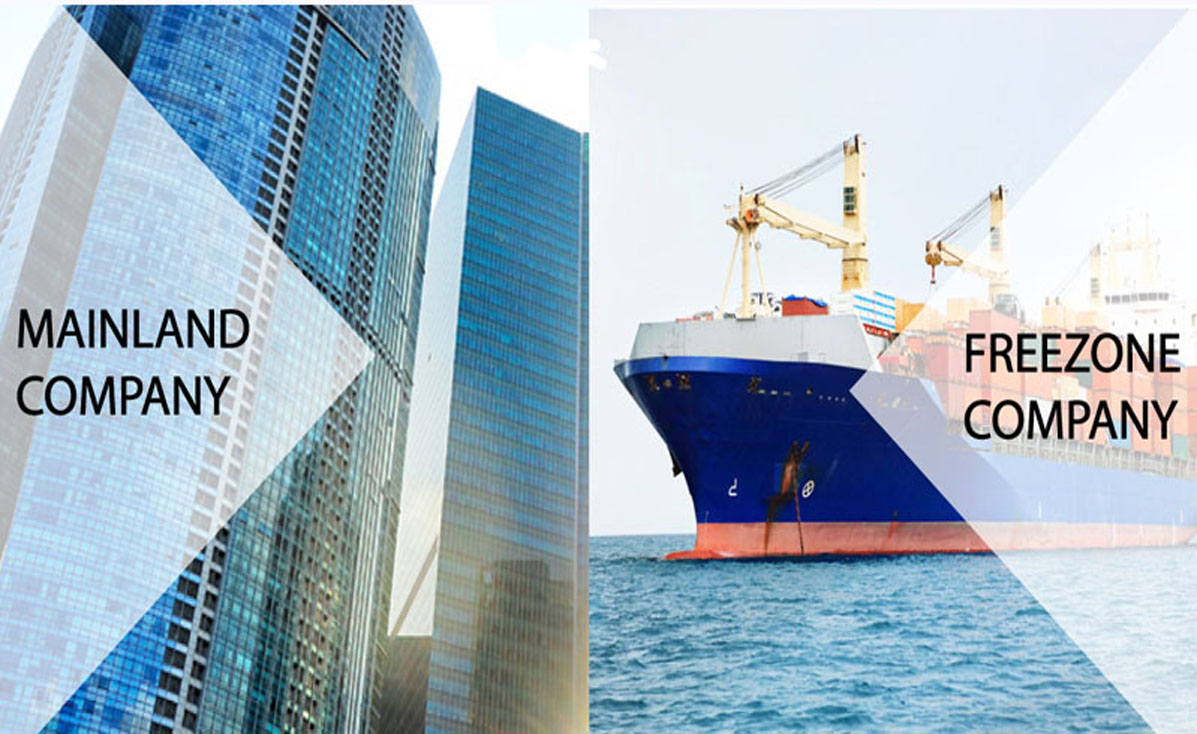If you’ve been considering setting up your business you may wonder how to choose between a Mainland Company and Free Zone Company. It’s important to know the difference between these two types available so you can choose the best for your business.
In this article, you’re going to learn everything you need to know about the two main types of companies in the UAE. You’ll going to understand the main differences between them so you can make a well-informed decision.
- Learn about the difference between Mainland Company and Free Zone Company
- What is a Mainland Company?
- What is a Free Zone Company?
- Which type of company should you choose?
- What are the major differences between Free Zone and Mainland Company?
- How can Connect FZ help you establish your company in the UAE?
1. Learn about the difference between Mainland Company and Free Zone Company
When you decide to start your business in the UAE you have to familiarize with some concepts first. The main aspect is to know the difference between two jurisdictions you can choose, which are the Mainland Company and Free Zone Company.
You should understand the basics about the jurisdictions where you can set up your business so you can make a proper decision. Whether you’re planning on opening an office in the UAE, or you’re planning an expansion, it’s important to be aware of the essentials about company formation.
1.1 Why should you know the difference?
As a business owner, prospective investor or entrepreneur, you may want to enter the UAE market. There are different business jurisdictions in the UAE, and you should understand the difference for the following reasons:
- It allows you to understand the basic rules about company formation
- You will know everything you need to do to start your business
- It gives you an overview of how to plan your company formation according the regulations
- You can select the best jurisdiction based on your business activity and requirements
If Sharjah Free Zone is in your mind as an option for setting up your business you should know more about it. You can achieve your goals as a business owner and reach success in this place if you know how to properly set up your company in this place.
Learn more about Sharjah Free Zone and how to carry out the company formation.
2. What is a Mainland Company?

Before choosing between a Mainland Company and Free Zone Company it’s important to understand each one of them. Therefore, it’s essential to know everything that is involved in a Mainland Company.
This type of jurisdiction is an inland or onshore company that gets its license from the Department of Economic Development (DED) of the concerned Emirate. Some of the characteristics of this company are the following:
- It’s allowed to carry out business in the local market and outside the UAE
- The government authority of the related Emirate is the one in charge of the registration
- It doesn’t have any restrictions regarding trading opportunity.
If you’re considering a Mainland Company you should know which license you need to operate legally. Depending on your business activity you’re going to select the license that best suits your business. This will allow you to carry out your business without any troubles.
Learn more about the different types of mainland licenses in the UAE.
3. What is a Free Zone Company?
To understand the difference between the Mainland Company and Free Zone Company it’s crucial to be aware of all the basic aspects of each one. Therefore, you should understand everything about a Free Zone Company.
When a business owner ops for a Free Zone Company it has to know that it’s incorporated within a special jurisdiction under a concerned Emirate. There are more than 40 Free Zones in the UAE and you can set up your business in any of them depending on the advantages that they can offer to your business.
If you’re wondering How to know if company is free zone you should consider its features. Some of the characteristics of a Free Zone Company are the following:
- The government regulatory body in charge of registration and regulation is the Free Zone Authority of the emirate where the company is formed.
- Each Free Zone offers various benefits and incentives to the businesses that are set up in that particular zone.
- The Free Zone Authority is responsible of issuing the trade license
- The Free Zone Company can only trade within the Free Zone where is formed and outside the UAE.
If you’re an investor or an entrepreneur and you’re interested in setting up your business in the Dubai Free Zone you need to know more about it. Starting a business is a major decision and for this reason you should understand the whole process.
Learn more about how to start a business in Dubai Free Zone.
4. Which type of company should you choose?

When choosing between a Mainland Company and Free Zone Company you may have your aims and preferences. However, you should evaluate the advantages and disadvantages of each one so you can select the most suitable for your business.
Both of these jurisdictions have certain benefits and offer investment opportunities but these are aimed to engage different types of investors. Although the choice could seem difficult, you can make the perfect decision as long as you have all the information.
What are the considerations for choosing the best jurisdiction? Let’s observe:
- What kind of activity are you going to carry out?
- What is the nature of your business?
- Do you want complete ownership?
- Are you considering conducting businesses within the UAE?
- How much capital do you have to set up your business?
- Do you need an office space?
You should ask these questions and based on the answers you would know which one is the best for you. Since each jurisdiction has its way of addressing these considerations you can make the decision based on which one offers you the best solution.
If you’re a professional that is looking for offering your services in the UAE, you need a professional license. Whether you opt for a mainland or free zone company you still need to process you license since it will allow you to work legally.
Learn more about what the professional license is and how you can get one.
5. What are the major differences between Free Zone and Mainland Company?

Once you know the basics it’s important to understand the major differences between a Mainland Company and Free Zone Company. Each jurisdiction offers a different approach regarding the following aspects so consider which one could be perfect for you.
5.1 Ownership of business
As a business owner or foreign investor you want to have full control and ownership of your business. In this sense, the two jurisdictions differ greatly. Let’s observe:
- Mainland Company: as a rule in the UAE the expat opting for a commercial license can acquire only the 49% of the company shares. The rest 51% should be acquired by a UAE national, whether a local service agent or a local sponsor. However, with a professional license, the expat can own 100% of shares but it’s still necessary a local service agent.
- Free Zone Company: the expat can enjoy the complete ownership of the company, for this reason you don’t need a local sponsor.
As you can see, the Free Zone Company is better for those who want to have complete ownership, but it’s also important to consider all the other aspects.
A common question business owners have when it comes to setting their business in Mainland vs free zone is if they can operate anywhere in the UAE. If you have this question, you have to continue reading.
Learn more about if free zone companies can work in Dubai Mainland.
5.2 Office Space
Another main Difference between freezone and mainland license is regarding the office or work space.
- Mainland Company: the business should have a physical office space and it should comply with a minimum of 200 sq. ft. It’s important to lease the area so you can get the license for your business
- Free Zone Company: it doesn’t necessarily need to have an office space. It means that you can opt for a virtual office or you can work without an office since it’s not a requirement.
In this regard, a Free Zone Company is a cost effective solution for setting up your business if you don’t want to rent an office space.
5.3 Scope of business
When it comes to the scope of business, there are some differences between a Mainland Company and Free Zone Company.
- Mainland Company: A main advantage of this jurisdiction is that allows companies to carry out business anywhere in the UAE. It means that you can do business within the UAE and outside as well.
- Free Zone Company: Since there are restrictions, you can only do business within the jurisdiction of your concerned Free Zone. It means you can’t do business within the UAE but you can outside.
Perhaps you’ve heard about the new DED initiative about Dubai Free Zone companies and their operation in the mainland but you still don’t know much about it. For this reason, you have to understand everything about this relevant information.
Learn more about the DED initiative about Dubai Free Zone Companies.
5.4 Visas
Another important difference between Mainland vs free zone relates to Visas.
- Mainland Company: You won’t have any restrictions in terms of visa eligibility. However, the area of your workspace determines the number of visas issued.
- Free Zone Company: Some restrictions for visa eligibility apply. It varies depending on each Free Zone regulations but usually it ranges from 1 to 6 visas issued. It means that if you need more visas you should then lease out an office space.
5.5 Audit
When it comes to company audit, it’s important to understand the following differences:
- Mainland Company: At the end of the financial year you’re obliged to prepare an audit
- Free Zone Company: Not all companies must deal with audit. However, some entities may be required to do it mandatory. It varies depending on the Free Zone Jurisdiction.
5.6 Capital requirement
The capital requirement is another difference between freezone and mainland license as we can observe:
- Mainland Company: The legal structure determines the minimum capital requirement of the business.
- Free Zone Company: The Emirate in which the company is formed is in charge of determining the minimum capital requirement.
5.7 Approval from government authorities
If you’re wondering How to know if company is free zone you should learn about the approvals that it needs to operate legally.
- Mainland Company: your company requires standard approvals such as the license issued by the DED, and from other government bodies like Ministry of Labour, Dubai Municipality, etc.
- Free Zone Company: the approval from government authorities varies depending on the Free Zone since each one has its set of rules and regulations. It may be necessary to get external approvals from government bodies and agencies but from those that belong to the concerned Free Zone.
6. How can Connect FZ help you establish your company in the UAE?

Here in Connect FZ we want to assist you with your expansion needs. Whether you want to set up a Mainland or Free Zone Company we’re readily available to help you. Our team of specialists will solve all of your inquiries and it will help you make the best decision.
We have experience helping several companies in a variety of industries to achieve their goals when entering the UAE market. You can contact us and we will offer you a customized service adapted to your requirements. Hence, we’re your best ally in the UAE.
Would you like to contact Connect Free Zone to help you process the Professional License in Dubai? You can call at +971 433 166 88 or send an email to [email protected] , and you’ll talk to one of their representatives that will gladly answer all of your questions.
Sanjyam Dhingra
![]() Sanjyam DhingraShe is an esteemed Compliance Officer with extensive experience in ensuring corporate adherence to regulatory standards. Her expertise spans a wide range of compliance functions, including regulatory analysis, risk management, and the implementation of compliance programs. She excels in identifying potential compliance issues and developing strategic solutions to mitigate risks.
Sanjyam DhingraShe is an esteemed Compliance Officer with extensive experience in ensuring corporate adherence to regulatory standards. Her expertise spans a wide range of compliance functions, including regulatory analysis, risk management, and the implementation of compliance programs. She excels in identifying potential compliance issues and developing strategic solutions to mitigate risks.

